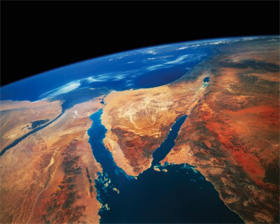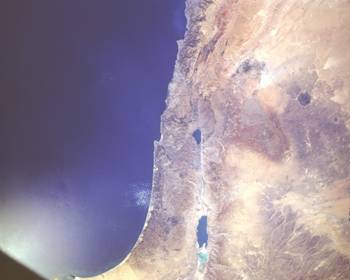The Victory of the Romans and the Lowest Point on Earth
Description: The Quran lays light on the lowest place of earth.
- By Sherif Alkassimi (© 2008 IslamReligion.com)
- Published on 23 Jun 2008
- Last modified on 15 May 2016
- Printed: 1,537
- Viewed: 182,274 (daily average: 30)
- Rated by: 252
- Emailed: 80
- Commented on: 17
 In the early 7th century, the two most
powerful empires at the time were the Byzantine[1]
and Persian Empires. In the years 613 - 614 C.E the two Empires went to war, with the Byzantines suffering a severe defeat at the hands of the Persians. Damascus and Jerusalem both fell to the Persian Empire. In the chapter, The Romans,
in the Holy Quran, it is stated that the Byzantines
had met with a great defeat but would soon gain victory:
In the early 7th century, the two most
powerful empires at the time were the Byzantine[1]
and Persian Empires. In the years 613 - 614 C.E the two Empires went to war, with the Byzantines suffering a severe defeat at the hands of the Persians. Damascus and Jerusalem both fell to the Persian Empire. In the chapter, The Romans,
in the Holy Quran, it is stated that the Byzantines
had met with a great defeat but would soon gain victory:
“The Romans have been defeated in the lowest land, but after their defeat they will soon be victorious. Within three to nine years. The decision of the matter, before and after, is with God.” (Quran 30:2-4)
These verses, above, were revealed around 620 C.E, almost 7 years after the severe defeat of the Christian Byzantines at the hands of the idolater Persians in 613 – 614 C.E. Yet it was related in the verses that the Byzantines would shortly be victorious. In-fact, Byzantine had been so heavily defeated that it seemed impossible for the Empire to even maintain its very existence, let alone be victorious again.
Not only the Persians, but also the Avars, Slavs and Lombards (located to the North and West of the Byzantine Empire) posed serious threats to the Byzantine Empire’s sovereignty. The Avars had come as far as the walls of Constantinople and had nearly captured the Emperor, himself. Many governors had revolted against Emperor Heraclius, and the Empire was on the point of collapse. Mesopotamia, Syria, Palestine, Egypt and Armenia, which had earlier belonged to the Byzantine Empire, were invaded by the Persians. In short, everyone was expecting the Byzantine Empire to be destroyed, but right at that moment the first verses of the chapter, The Romans, were revealed announcing that the Byzantines would regain triumph in a few years time. Shortly after this revelation, the Byzantine Emperor proceeded to order the gold and silver in churches to be melted and turned into money in order both to meet the demanding expenses of the army, and finance his drive to regain the lost territories.
Around 7 years after the revelation of the first verses of The Romans, in December, 627 C.E, a decisive battle between The Byzantine Empire and the Persian Empire was fought inthe area around the Dead Sea,[2] and this time it was the Byzantine army which surprisingly defeated the Persians. A few months later, the Persians had to make an agreement with the Byzantines which obliged them to return the territories they had taken from them. So, in the end, the victory of the Romans proclaimed by God in the Quran miraculously came through.
Another miracle revealed in the mentioned verses is the announcement of a geographical fact that no-one would have been able to discover in that period. In the third verse of The Romans, it was mentioned that the Romans were defeated “in the lowest land” (Quran 30:3). Significantly, the places where the main battles took place (in Damascus and Jerusalem) lie in a vast area of low-lying land called the Great Rift Valley. The Great Rift Valley is a huge 5,000 km fault line in the earth’s crust that runs from northern Syria in the Middle-East of Asia to central Mozambique in East Africa. The northernmost extension runs through Syria, Lebanon, Palestine and Jordon. The rift then extends south to the Gulf of Aden, makes its way through East Africa, then finally ends at the lower Zambezi River valley in Mozambique.
An interesting fact that has been discovered recently, with the help of satellite images, is that the area around the Dead Sea (located in the Great Rift Valley) has the lowest altitude on Earth. In fact, the lowest point on Earth is the shoreline of the Dead Sea, with an altitude of around 400 meters[3] below sea level. The fact that it lies at the lowest point means that water does not drain from the sea. No land point on earth has a lower altitude than the shoreline of the Dead Sea.[4]

Dead Sea Rift Valley, Israel and Jordan October 1984. Seen from an altitude of 190 nautical miles (350 kilometers) in this near-vertical photograph, the Dead Sea Rift Valley slices south-north through the Middle East. The surface of the Dead Sea, 1292 feet (394 meters) below sea level, is the lowest point on Earth. (Courtesy: The Image Science & Analysis Laboratory, NASA Johnson Space Center, Photo #: STS41G-120-56, http://eol.jsc.nasa.gov)
Therefore it becomes clear that the country or prefecture which occupies the rift valley in the vicinity of the Dead Sea is what is meant in the Quran by “the lowest land.” This is a true miracle of the Quran because no-one could have known or foreseen such a fact in the 7th century due to the fact that satellites and modern day technology were not available at the time. Once again, the only possible explanation is that Prophet Muhammad had truly received divine revelation from God, The Creator and Originator of the universe.

























